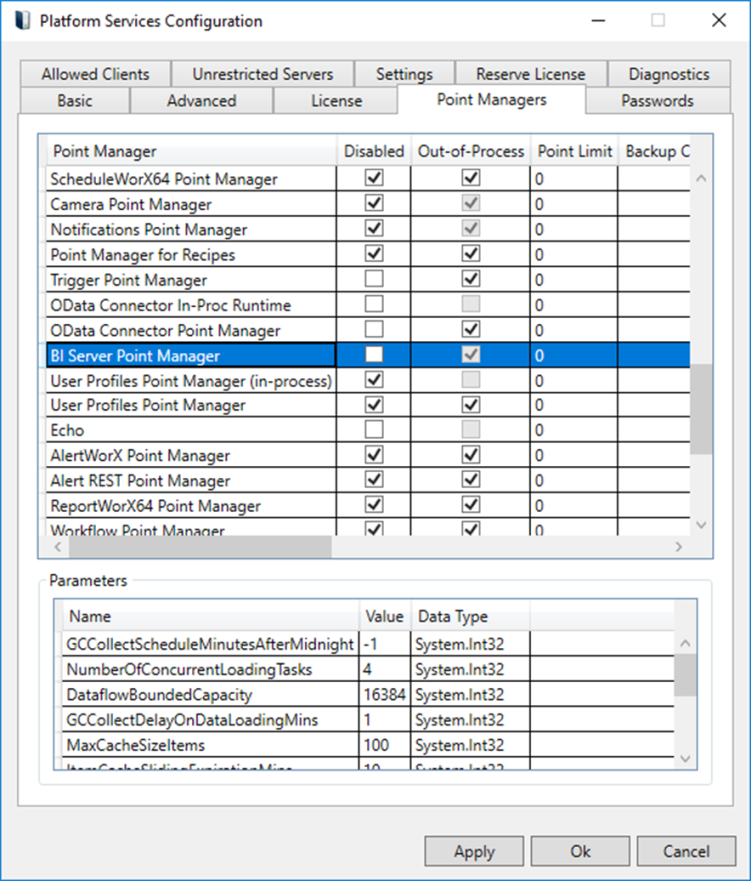|
|
The features on this page require a GENESIS64 Advanced license and are not available with GENESIS64 Basic SCADA . |
|
|
The features on this page require a GENESIS64 Advanced license and are not available with GENESIS64 Basic SCADA . |
The Platform Services Configuration utility allows users to change some advanced runtime parameters for the AnalytiX-BI Server.
Advanced Runtime Parameters for AnalytiX-BI Server in Platform Services Configuration

The parameter list shown in the utility does not necessarily contain all the available parameters. The parameters that are not in the list can be manually added to the FwxServers.PointManagers.config file and then modified using the form displayed above.
The following table contains the complete list of available parameters and their effect on the AnalytiX-BI Server runtime. Please note that changes to any of these parameters require restarting the AnalytiX-BI Server.
|
Parameter Name |
Default Value |
Description |
|
NumberOfConcurrentLoadingTasks |
4 |
Each data table in an online data model triggers a loading task to ingest the table’s data when the server starts up. This setting defines how many loading tasks the BI Server can run concurrently. |
|
DataflowBoundedCapacity |
16384 |
Defines how many rows are requested at the time from the data source associated with the data table. |
|
DataLoadTimeoutSec |
120 |
Defines the time, in seconds, after which a loading task will be considered timed out and then aborted.
Loading tasks process the data in chunks of rows (see DataflowBoundedCapacity parameter) and this timeout value applies to reading a single chunk of data from the dataflow, after which it will reset to read the next chunk.
Please note that there is a notable exception for data flows using the Transpose Step, as this step must consume the entire input before producing its output which means that this parameter value must be made large enough for the Transpose step to have the time to consume the entire input data source.
A loading task that times out is not retried. The retry count and retry delay below do not apply to loading tasks that have timed out. |
|
DataLoadRetryCount |
3 |
Defines how many times to retry a loading task if the task fails (returns an error or has an exception). |
|
DataLoadRetyDelayMsec |
10000 |
Defines the amount of time to wait, in milliseconds, after a loading task failure before retrying. |
|
GCCollectDelayOnDataLoadingMins |
5 |
Defines the delay after which the BI Server will perform a full garbage collection with Large Heap compaction when some runtime operation has caused table data to change. Such operations include: loading data into a table (either on start up or via trigger), changes to the table schema that require a data reload or changes to the data model (going offline, deleting or adding tables). Configuring this setting to a negative value disables this behavior. |
|
MaxCacheSizeItems |
1000 |
Defines how the maximum number of query results to keep in the AnalytiX-BI Server cache. If the cache is full, existing results are evicted from the cache by LRU (Least Recently Used). |
|
ItemCacheSlidingExpirationMins |
10 |
Defines a sliding window of inactivity. If a cached query result is not accessed in inactivity window, it will be dropped from the cache. |
|
False |
When true, exposes single column datasets as FrameWorX arrays. |
|
|
False |
When true, the @@LastError point will be available in runtime for Data Tables under the @@Diagnostics folder. |
|
|
GCCollectScheduleMinutesAfterMidnight |
-1 |
Instructs the server to manually run a forced Garbage Collection with Large Object Heap compaction. When set to a negative value (default) this feature is disabled. A value greater than or equal to 0 specifies the number of minutes after local midnight to wait before scheduling the garbage collection.
This forced garbage collection should not be necessary for most systems. .NET Framework should be managing the memory usage, and releasing the memory as needed over time. However, some systems may want to use this daily check to prevent the perception that the AnalytiX-BI engine is leaking memory or to better manage a high-memory system. |
|
EnableQueryPlanCache |
False |
When true, the server will cache query execution plans after they are generated the first time.
Caching query plans might improve execution times of small queries, where the time spent in building the execution plan is comparable – or greater – than the time spent executing the query. |
|
EnableColumnStatistics |
False |
When true, the server will keep track of columns involved in predicates of executed queries. Based on usage, statistics will be automatically created for frequently used columns and, for the most used columns in predicates, an index may be created as well.
Statistics help the query optimizer in reordering predicates to improve query execution times. Indexes are used, when applicable, in place of table scans to improve query execution times. |
See Also: